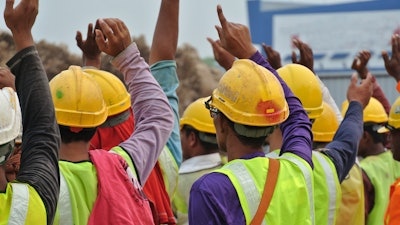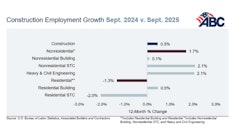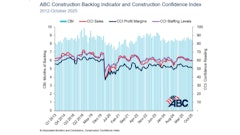
If there is one issue that we have all faced recently, it’s labor….or lack of it. This is evident not just in construction but in almost every industry you look at, from manufacturing to restaurants to hospitality. It's honestly unbelievable that we are in such dire straits to find help.
I do think things are slowly improving, but there are actions we as owners can take to ease and improve our labor situation. I have found that treating the crews with respect pays dividends down the road. They tend to be more productive, do quality work, and stay with the company.
As regular readers of this column know, I love to observe businesses. One thing I have noticed is that many businesses I observe or interact with just don't treat their people well. What’s even more crazy is they dare to do this in times like today, when labor – especially quality labor – is scarce.
I hate to admit it, but we are in an employees’ market (this isn’t news, is it?). If an employee doesn't like the job they have, off they go to the next one – and unlike in years past that next job is out there just waiting for them. And really the only loser in that situation is us as owners. If an employee leaves, not only do we have to find someone to take their place, we have to train them and make them productive as soon as possible. Even if that all goes smoothly – and it rarely does – productivity takes a hit.
All this got me thinking about how we treat people at my company and why others don't prioritize this as much as we do. I’ve seen many pavement maintenance businesses that think about so many aspects of how to make their business better, yet they overlook treating their people well.
So, what about your business? Once you’ve found someone to hire, are you treating them the best you can? I’m not talking about buying their affection to your company with lunches or trips, but rather, are you creating a level of respect?
We have a culture at my company that I treat everyone as I want to be treated. I also have an understanding of what they do in their jobs, meaning I get that they are out on triple-digit temperature days working with materials that are even hotter. I know it's not pleasant, yet they do it, and do it well.
So, how would I want to be treated if that was me out on the front line? Well, I’d like the company to be empathetic on scheduling – and we are. For example, if a crew has had a long job the day before, their next day might not be packed as full. We also are cognizant of “little” things such as giving breaks and making sure they get some time off each week, even if it's not over the weekend. This can be difficult, as we are in a seasonal business and need to produce as much work as we can in a limited time, but it’s important to do because it lets our workers know that we understand what they go through on a daily basis.
What else would I expect? I expect to be appreciated and treated respectfully – and we try to do that at my company. Some if the issues I’ve observed at other companies come down to a flat-out lack of respect. This tends to happen more frequently with larger companies, but even at small companies I’ve witnessed where there is just not enough respect given to frontline employees. That “lack of respect” can vary from rigid time-off policies, to keeping people too long on “grunt” or entry-level jobs without an opportunity for advancement, to overworking schedules, to just a flat-out rude attitude by owners toward workers.
I recall a large retail chain (that shall remain nameless) that used to have a phrase on their vests that claimed “Our People Make the Difference.” This was true, and I really think this approach and motto propelled this large company forward. Unfortunately, this company lost sight of that and now doesn't seem to care about the front line as they once did -- and it shows in an unsatisfactory customer experience.
It's the same for us in the asphalt industry. If you appreciate and respect your people and are consistent about showing them that, your employees can make a difference.
And they’ll make a difference if you don’t respect them, too. A person who hates their job will inevitably show it. Their dissatisfaction might surface as a poor attitude, which will affect others on the crew, or they might interact poorly with a customer. Their unhappiness might surface in terms of quality issues on the job -- all because they lost their desire to care. True, this can happen for a variety of reasons, but generally if people feel appreciated, they show it – the result being your people making a positive impact on your business.
Here's the reality check: Many of us are the face of our company, always gladhanding the clients. But it is our frontline workers making the magic happen and making the company money. They’re skilled, they’re productive, they interact with the client (and often the general public), and they do it in often difficult conditions. But without them, the business wouldn't work.
I am convinced that if we have a little empathy and compassion for our workers, and understand the difference they can make in our company, then we will be better off. Happier workers do better jobs and bring in more money, hands down.



















